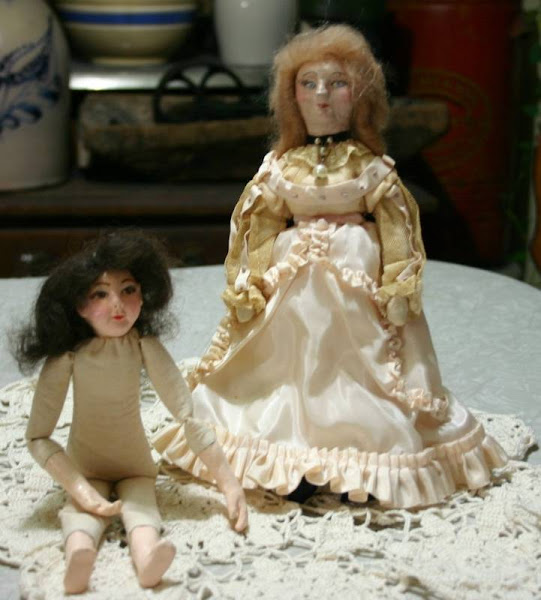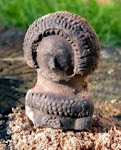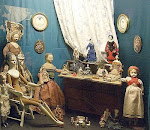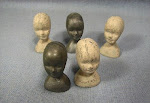IRELAND’S HISTORIC DOLL hospital and teddy bear clinic is to close down today. After 74 years of mending the dolls and teddy bears of Ireland, The Doll Store’s owner Melissa Nolan has decided to shut up shop. Nolan told The Journal.ie that the hard decision was made for purely business reasons. “Business is good but the accumulation of overheads – rent, insurance, rates – became too much. We have tightened our belts as much as possible so we had to come to this decision last year,” she said. The landlord tried to meet the tenants halfway in terms of rent but other factors, including the recession, meant the business location was no longer feasible. Although there will be no physical presence on Georges Street anymore, The Doll Store will continue to trade online. Nolan and her husband, who have been running the clinic for 28 years, are also looking for a space that they could turn into a children’s museum – an idea they hit upon following the outpouring of goodwill on news of the shop’s closure. “We have been hit for six with the number of calls and visits,” she said. “People have come to say goodbye from all over the country. We knew that we were different and that we were dealing with people’s treasures and sentiments but it has been an incredible emotional journey over the past couple of weeks. The doll hospital was first established on Mary Street in 1938 and moved to its current George’s Street location in 1982. As one of the last remaining doll hospitals in the world, The Dollstore receives items for repair and restoration from other countries, particularly the US and Italy. Ireland’s first teddy and doll museum “We’re now looking for a home that we could set up shop and incorporate a museum. We have so many dolls and teddy bears from over the years that are packed up and ready for storage,” continues Nolan. It would be great if we could display them for people to enjoy. People have said they want to buy some of our counters or glass cases – which all come from the 1940s but if we sell them it would be hard to get them all back together again.” As for Saturday, the Nolans are expecting another emotional day. Already this week they have been visited by many former customers, reliving their childhood memories. “A 76-year-old woman came in yesterday and told us how she came to Dublin twice-a-year with her father and her first memory of the visits is coming to the store to pick a Christmas present,” she recalls. “She got very emotional being in the shop again.” Have you any memories from The Doll Store? We’d love for you to share them in our comments section below. The Doll Store Previous6 / 8Next • The Doll Store • The Doll Store • The Doll Store Previous • • • • • • • • Huguette Clark, the reclusive copper heiress, dies at 104 By Bill Dedman Investigative reporter NBC News 5/24/2011 4:46:26 PM ET NBCNews.com Huguette M. Clark, the mysterious copper heiress who became the subject of public fascination and police investigation after a century of life as a recluse, died Tuesday morning at age 104, registered under a fake name at a hospital in New York City. Her empty mansions, and a criminal investigation into the handling of her fortune, were the subject of a series of reports last year on msnbc.com. The criminal investigation continues into the handling of her money by her attorney and accountant, with detectives and a forensic accountant poring over the many years of Clark's financial records. An assistant district attorney was able to visit with Clark in the hospital, more than once, and to have a conversation with her, in both French and English. A state grand jury in Manhattan issued subpoenas for documents. It could be months before the investigation's conclusion is known. Though she inherited one of the great mining fortunes of the 19th century, she lived quietly into the 21st century, secluded in a spartan hospital room for more than two decades despite being in relatively good physical health. Intensely shy, in the last year of her life she became a subject of public fascination, a trending topic of searches on Google and Yahoo, pictured on the cover of the New York tabloids, with fan pages on Facebook, a biography on Wikipedia, and her story read by tens of millions — though the last known photograph of her was made in 1930. After msnbc.com reported her death Tuesday morning, based on sources at the hospital, her attorney issued a brief statement of confirmation: "Madame Clark's passing is a sad event for everyone who loved and respected her over the years," said Michael McKeon, spokesman for attorney Wallace "Wally" Bock. "She died as she wanted, with dignity and privacy. We intend to continue to respect her wishes for privacy." The cause of death was not disclosed. She was just two weeks short of her 105th birthday, on June 9. In recent years her eyesight had failed and her hearing was weak, and at times she had been unwilling to eat. She was moved in mid-April from her private room at Beth Israel Medical Center in New York up to its medical intensive care unit, then in mid-May to a room with hospice care. She had been living at the hospital under pseudonyms — the latest was Harriet Chase — in a guarded room with full-time private nurses. Her hospital room number didn't even exist — outside her room on the 3rd floor, a card with the fake room number "1B" and the name "Chase" was taped over the actual room number. When she was moved to intensive care, room 1B was cleared of her belongings, and the card was removed. Huguette Clark has been almost entirely alone, aside from her private nurse and occasional visits by her accountant. One of her former attorneys represented her for 20 years without meeting her face to face, instead talking through a closed door. She outlived her closest friend and social secretary, Suzanne Pierre, who was also French and the widow of Huguette's doctor. Madame Pierre died this spring after suffering from Alzheimer's disease in recent years. A decade ago, Clark gave her a gift of $10 million by selling a painting. Born to high society and scandal Huguette (pronounced "u-GET") Marcelle Clark was born in Paris on June 9, 1906, the youngest child of U.S. Sen. William Andrews Clark of Montana (1839-1925), known as one of the copper kings. When she was a child, her father was described by The New York Times as either the richest or second-richest American, neck and neck with John D. Rockefeller. W.A. Clark made a fortune in copper mining in Montana and Arizona, and owned banks, railroads, newspapers, sugar, tea, timber, real estate and many other investments. He served one full term in the Senate as a Democrat from Montana, from 1901 to 1907, despite having to give up the seat earlier in 1900 in a scandal involving bribes paid to legislators to send him to the Senate. (The explanation attributed to him: "I never bought a man who wasn't for sale.") The 17th Amendment to the U.S. Constitution, which removed the election of senators from the hands of legislators and gave it to the people, is a backhanded tribute to his legacy. While serving in the Senate in 1904, the 65-year-old widower shocked the political and financial world by announcing that he had secretly remarried three years earlier, and that he and his 26-year-old wife already had a 2-year-old daughter, Andrée. A second daughter, Huguette, was born in 1906. When Huguette was about 4, the family of four moved into a 121-room house at Fifth Avenue and 77th Street in New York City, stuffed with the senator's collection of French paintings. The senator died in 1925 and soon was largely forgotten, except to the occasional question on Jeopardy! and to historians in Montana, Arizona and Nevada, where his railroad spawned the city of Las Vegas and where Clark County is named for him. This is the last known photo of Huguette Clark, taken 80 years ago. She has hidden away in a New York hospital room for at least the past 22 years. This photo was made on Aug. 11, 1930, the day of her divorce, in Reno, Nev. Her marriage lasted two years. She has no children. Associated Press Huguette Clark grew up in high society in New York City and was educated at Miss Spence's School for Girls. When her father died, she received an allowance of $7,500 a month (about $1.2 million a year in today's dollars), and when she reached 21 she inherited one-fifth of her father's estate, an even split with his children from his first marriage. The entire estate was estimated at up to $300 million, or about $3.6 billion today. She was married in 1928, at 22, to William Gower, a law student and Clark family employee. The couple soon separated, had no children, and divorced in less than two years, in the summer of 1930. Thereafter she lived with her mother, Anna, in the apartments at 907 Fifth Ave. (at 72nd Street), occasionally receiving family visitors and a few friends, until Anna died in 1963. Empty mansions and financial questions In February 2010, at age 103, Huguette Clark was the subject of a feature story on msnbc.com, a photo narrative of her life and family history. She caught the imagination of the public because her three opulent homes remained unoccupied: an estate alongside the Pacific Ocean in Santa Barbara, Calif., worth an estimated $100 million, which she had not visited since the 1950s; a country house in New Canaan, Conn., on the market for $23 million, which she expanded but never spent a night in; and the largest apartment on New York City's Fifth Avenue, actually 42 rooms on the 8th and 12th floors, valued at about $100 million. Full coverage: 'The Clarks, an American story of wealth, mystery and scandal' The homes have been carefully maintained through all these years. The oceanfront estate in Santa Barbara remains furnished, with paintings on the walls, gardens tended, furniture carefully covered, the great house ready to be opened if she should send word of an impending visit. The country house in Connecticut has had extensive repairs, watched by a full-time caretaker who said he wasn't sure whether Clark was dead or alive. And the apartments in New York, with her collections of dolls and dollhouses as well as fine paintings and furniture, are visited regularly by housekeepers and her attorney. Irving Kamsler, Huguette Clark's longtime accountant, pleaded guilty in October 2008 to attempting to disseminate indecent material to minors. The court sentenced him to five years of probation, but he was allowed to keep his license as a certified public accountant. In a letter he told his client only the barest details of the case. Claudio Papapietro Then a feature story became an investigation. Msnbc.com reported in August that her wealth was managed by her attorney, Wally Bock, 79, of Queens, N.Y., and her certified public accountant, a felon named Irving H. Kamsler, 64, of the Bronx, N.Y. Kamsler pleaded guilty in 2008 to attempting to distribute indecent material to 13- and 15-year-old girls in an AOL chat room, where he went by the handle "IRV1040." He remains a registered sex offender in New York. Msnbc.com also reported that the attorney and accountant became the owners of the New York City apartment of another elderly client, a lawyer at Bock's firm who had been Clark's attorney. The apartment was bequeathed to them after the man's last will and testament was revised six times during his last years, a period when his family and neighbors said he suffered from dementia. The Manhattan district attorney began investigating the handling of Clark's finances. The DA's Elder Abuse Unit and New York City police detectives have looked at allegations relating to transactions in her bank accounts, as well as the confidential sale of her Stradivarius violin for $6 million, the sale of a Renoir painting for $23.5 million, the gift of $10 million to the friend and social secretary, and the gift to her longtime nurse of cash to buy four homes now worth about $1.7 million. The criminal investigation is being handled by the same prosecutor as the Brooke Astor case, in which the son and attorney of the New York heiress were convicted in 2009 of stealing from her. Huguette Clark's fortune is said to be about four times that of Astor's. Attorney Wallace "Wally" Bock says he has always done exactly what his client, heiress Huguette Clark, has asked. He acknowledged soliciting from her a gift of $1.5 million for the community where his daughter and grandchildren live. Christopher Sadowski The attorney and accountant had not been accused of a crime in the handling of the Clark finances, and both men said through written statements last year that they had handled Clark's affairs in accordance with her wishes. A family fight to protect her In September, three Clark family members went to court in New York , asking that a guardian be appointed to protect her. The relatives (her half-nieces and half-nephews, descendants of Clark's father from his first marriage) said they had been blocked from visiting Clark through the years and, citing news articles, they alleged that the attorney and accountant had exerted undue influence on her. (Read the document: the family's petition.) The attorney, Bock, confirmed in court documents that after the terrorism attacks of Sept. 11, 2001, he had solicited a donation from Clark of more than $1.5 million, which she gave to a West Bank community where his daughter is a settler. Bock said that she gave the donation freely of her own accord. New York ethics rules prohibit lawyers from soliciting gifts from clients "for the benefit of the lawyer or a person related to the lawyer." Bock also revealed that she signed a will more than five years earlier, and that Bock and Kamsler have a power of attorney to handle all her financial affairs. Bock told the court he has safeguarded Clark's health, safety, welfare and privacy. He said she chose to live in the hospital, even when she was well. He denied controlling her affairs and access to her, saying he has merely carried out her wishes. "Ms. Clark has explicitly instructed me on many occasions that she does not want visitors and does not want anyone — including her relatives — to know where she resides," Bock wrote. (Read the document: Bock's sworn statement to the court.) Telling the client less than the full story The court documents also included a 2009 letter in which Kamsler told Clark obliquely of his guilty plea. He characterized his arrest in his letter to his client this way: "I recently visited with you and explained my legal situation concerning my pleading guilty to a single felony charge involving the use of my computer to attempt to communicate with minors, who in fact were not minors but were undercover agents." His letter was signed by "H.M. Clark" to indicate her willingness that he continue as one of her executors and trustees. Bock and Kamsler have both declined to say whether they are also named as beneficiaries. (Read the document: Kamsler's letter signed by Huguette Clark.) Kamsler's letter didn't mention that he was indicted on five charges, or that he was charged with trying to disseminate indecent material to people who he thought were 13-year-old and 15-year-old girls, or that he tried to get the girls to engage in sexual acts and suggested they meet him in a "deserted road or park." (Read the document: Kamsler's criminal court file and investigator's report.) A state judge rejected the family petition , without a hearing, saying their claim was "insufficient in its hearsay, conclusory and speculative assertions" on the capacity of Clark to handle her affairs. The case presented something of a Catch-22: The judge said the relatives were not able to provide first-hand information about Clark to prove their allegations against the attorney and accountant, but the relatives said they had been prevented for many years by the attorney and accountant from visiting Clark. (Read the document: the judge's rulling.) Any will filed by Bock could be contested, which would lead to a court battle over her fortune. If a court invalidated the will, Clark's estate would flow to her nearest relatives, presumably the dozen or so direct descendants from her father's first marriage. 1. Related content 1. Generosity of an heiress: 4 homes for the nurse 2. Report sparks welfare check on reclusive heiress 3. Who is watching reclusive heiress's millions? 4. At 104, mysterious heiress is alone now 5. Complete coverage John Makely / msnbc.com Flowers on Tuesday at the door to the Clark mausoleum, where Huguette Clark will be interred. Burial No information was available about any funeral Mass for Clark, who was raised a Roman Catholic, like her mother. The family has made preparations in recent years for Clark to be entombed in the grand Clark family mausoleum at Woodlawn Cemetery in the Bronx, N.Y. Construction at the mausoleum was taking place in March to make room for Huguette, who had not made arrangements before, though the mausoleum was built before she was born. Also resting there are her sister, who died of meningitis at 16; their father the senator; his first and second wives, and other children and relatives from his first marriage. On Monday, the day before she died, schoolchildren in Montana began a campaign writing letters to Huguette Clark, asking her to send money back to the state to revive Columbia Gardens, an amusement park and fairgrounds her father built for the miners of Butte. With her sister, she visited the gardens when they were children. ——— Contact reporter Bill Dedman Related content for "The Clarks: An American story of wealth, scandal and mystery": • All of msnbc.com's reports on Huguette Clark are gathered at clark.msnbc.com. • The photo narrative from February on Huguette Clark and her empty mansions (on this page) • A PDF file for printing the photos • Notes and documents consulted in researching the Clark family story • Part one of the investigative report: At 104, mysterious heiress is alone now • Part two of the investigative report: Who is watching Huguette's millions?
 |
| French Paper Dolls, Antique, Public Domain |
























































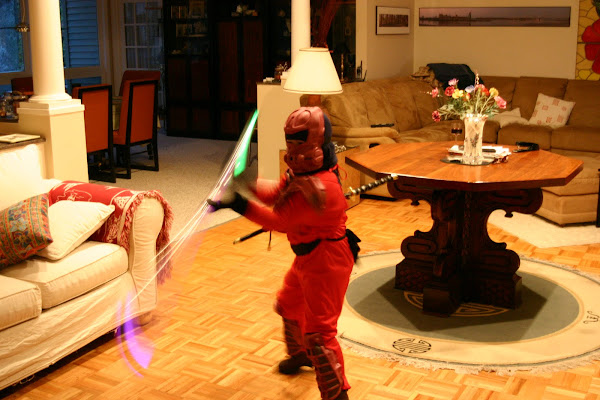

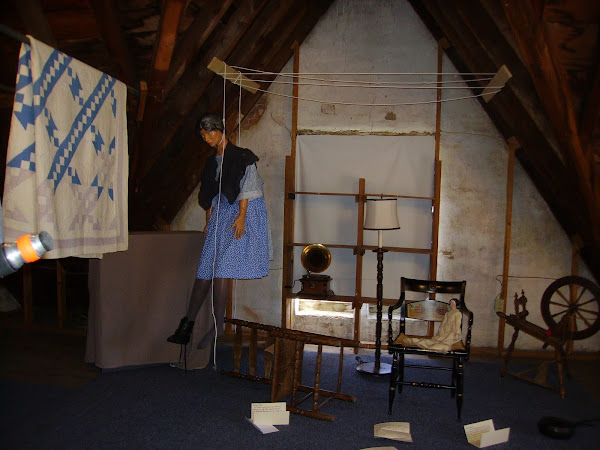
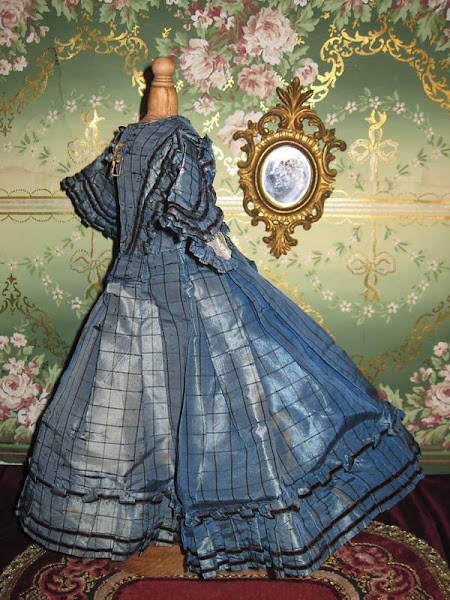wCWk~%24(KGrHqV,!h8Ew5GsnS3dBMUy3MzVPg~~_3.jpg)


